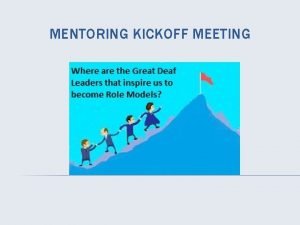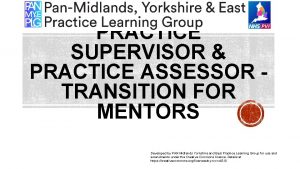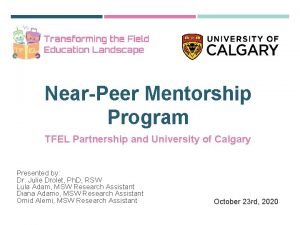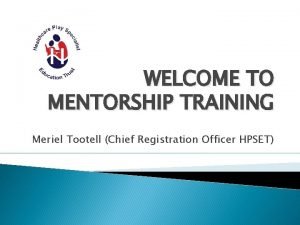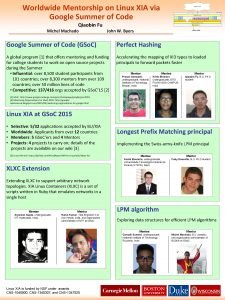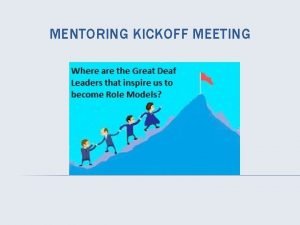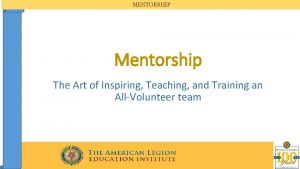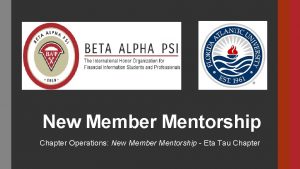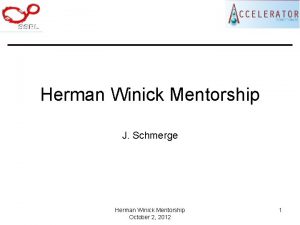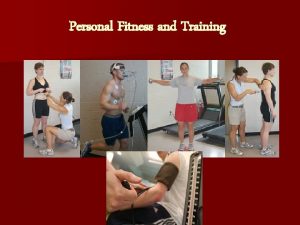Training on Mentorship The Mentorship is a personal










- Slides: 10

Training on Mentorship

The Mentorship is a personal developmental relationship in which a more experienced or more knowledgeable person helps to guide a less experienced or less knowledgeable person. The mentor may be older or younger, but have a certain area of expertise. It is a learning and development partnership between someone with vast experience and someone who wants to learn.

PEER MENTORS IN THE FIRST YEAR EXPERINCE PROGRAM PEER MENTORS; 1. GIVE GUIDANCE TO THEIR PEERS ON ACADEMIC AND NON-ACADEMIC MATTERS 2. ANSWER THEIR PEERS’ QUESTIONS ON WHATSAPP and MEET THEM IF NECESSARY 3. WRITE A MODULE REPORT AND GIVE FEEDBACK

A MENTOR DOES NOT ACCEPT PEOPLE AS THEY ARE JUDGE MENTEES HELP MENTEES SEE ALTERNATIVES FOR DECISION MAKING DOMINATE/TELL MENTEES WHAT TO DO/IMPOSE HIS/HER OWN SOLUTION VALIDATE PEOPLE WITHOUT BEING PHONY RESCUE RESPECT CONFIDENTIALITY GIVE SUPPORT TO TAKE POSITIVE ACTION REFER STUDENT TO THE APPROPRIATE RESOURCES AND SERVICES GOSSIP PUT MENTEES DOWN EXPECT ALL PROBLEMS TO BE FIXED QUICKLY AND EASILY

THE ROLE OF THE PEER MENTOR IS PRIMARILY: • To assist students with the orientation into university life • To support students in confidence building and transitioning to further education • To provide general academic advice on their lessons/ study hours/ habits. . etc • To provide short term support and give practical help to students on a daily or more long term basis • To give students help and advice about non-academic matters and refer to professional student services for assistance • To foster a sense of group dynamic & team spirit amongst students • To manage emergency and crisis situations which impact on students

Benefits of Peer Mentoring skills For Mentors For Mentees Improved reasoning skills Increased academic achievement Improved communication Improved social skills Increased self-esteem, increased empathy Greater feeling of connection to school and peers Improved conflict resolution skills; greater patience; improved organizational skills Decreased behavioral problems; lower rate of engaging in risky behaviors Increased “cultural capital, ” which helps mentors Increased school attendance; greater rate of continuing to understand their own challenges and education experiences

WHAT CAN A MENTOR SAY/ DO IN THE FIRST MEETING? • Prepare your talk in advance • Be positive and friendly • Introduce yourself and talk about your prep experience briefly • Join the team activity • Encourage your group to join the activity and relax • • Tell your group what you can do for them • Start a Whats. App group • Answer their questions

SUGGESTIONS ABOUT WHAT TO TELL Come to us if you • are feeling lonely and homesick • have personal or family problems • have complaints about something in the university • are unsure where to go for help? ? ? • need academic support/ strategies for managing student life/ lessons !!! • have accommodation problems

FIRST YEAR EXPERIENCE - COURSE DESIGN – SUMMARY DRAFT FOR MODULE 1 & 2 Module 1 Module 2 W 1 -2 Adjustment University & SFL Orientation – 5 -minute Video Recording Student Handbook- Treasure Hunt- Çigdem’s Tests & Surveys- Getting to know each other- Team work activities-Meeting with Mentors- Opening a Group Account- Homework hotline W 3 -4 Goal Setting & Time Management 50 things you want to do. / Share them with your partner. Create a plan to achieve your goals / Academic goals exploration. Learning to prioritize- What are the 3 biggest distractions you are currently facing? How can you lessen these distractions? “ Which one is the first? ” Sequencing activity/ Tests W 5 -6 Expected student Profile What is it the university student profile at ISIK? Expected classroom behavior- Discussion / Watching Videos/ Questionnaires / Quiz shows / Reading student letters /Preparing Survey questions ( What annoys you the most? Is it appropriate…etc ) Creative Drama Exercises. W 7 -8 Diagnosing learning difficulties / Learning Styles and Strategies Quiz show ( Diagnostic) / Tests –( Identify their learning style) Fun Games -Multiple Intelligent Tests / Problem Solving activities What is good for my learning? / How do I learn best? What should I do? Solutions & Practical Hints Guest Speaker Librarian Doctor Counselor Student / Club President W 9 -10 Being an autonomous learner / Study Habits Setting clear performance standards from the start Helping students develop a sense of ownership over the learning process. Providing feedback to students and encouraging students to assess their own learning progress W 11 -12 What are the secret of being successful in lessons? Practical ways to be successful in class- the difference between good and poor students - the major determiners of success Dealing with fears and developing tolerance to the learning stages Guest Speaker Freshman students & teachers Guest Sp. ? Çigdem?

CERTIFICATE OF APPRECIATION FROM IŞIK UNIVERSITY SFL DEPARTMENT awarded to Name For being an Outstanding Student Mentor We couldn’t do it without you! Awarded this ___ day of _____, 20__ Presenter Name and Title
